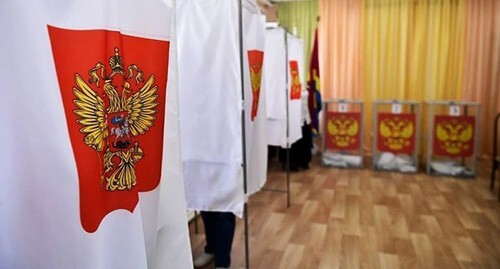Activists treat situation with voting irregularities in Southern Russia as catastrophic
There was practically no independent monitoring at the polling stations, but it appeared to be possible to record more than 160 violations in Southern Russia, noted activists of the “Golos” (Vote) movement*. They questioned both the final numbers of the votes gained by presidential candidates and the turnout data.
The “Caucasian Knot” has reported that in the republics of Northern Caucasus, Vladimir Putin received the highest number of votes in Chechnya – 98.99%, the Central Election Commission (CEC) reported.
David Kankiya, a member of the Council of the “Golos” (Vote) movement*, announced that there were practically no observers at the polling stations in the North-Caucasian Federal District (NCFD). “There were no independent observers in principle. Therefore, there was very little real information reported from the polling stations,” David Kankiya said.
The activist emphasized that at the polling stations with observers, the latter recorded violations. “Especially in the Krasnodar Territory. Members of the election commissions recorded several ballot stuffing. The person who caught the first ballot stuffing was arrested for 14 days for failure to obey the police,” David Kankiya noted.
According to the activist’s version, the reports from the polling stations in Karachay-Cherkessia suggest falsification.
David Kankiya emphasizes that the situation following the election results is catastrophic. “For example, the percentage of turnout declared for Chechnya (97.06% in accordance with the report of the Central Election Commission (CEC), – note of the “Caucasian Knot”) is not much different from 90% in the Krasnodar Territory or 77% in the whole country. Because those numbers are not natural and do not correspond to how many people came to polling stations and how they voted. Those people simply weren’t at the polling stations,” David Kankiya said.
The activist also noted that during the current presidential election, there were much fewer appeals to the “Golos” (Vote) movement* than during the previous presidential election in Russia.
On March 17, voters in the North-Caucasian Federal District (NCFD) complained about coercion to voting. In particular, in Chechnya, a public sector employee claimed forced participation in “carousels.”
Roman Udot, the former leader of the “Golos” (Vote) movement*, explained a decrease in the number of reports about violations by a decrease in the number of observers at polling stations.
The Chechen political analyst considered observation and monitoring at the current presidential election pointless. “The voting results have been calculated and compiled in advance,” the political analyst said.
*On August 18, 2021, the “Golos” (Vote) all-Russian public movement in defence of voters’ rights was included in the new register of unregistered public associations performing the functions of a foreign agent. The movement’s website is blocked in Russia.
This article was originally published on the Russian page of 24/7 Internet agency ‘Caucasian Knot’ on March 19, 2024 at 05:41 pm MSK. To access the full text of the article, click here.
Source: СK correspondent

